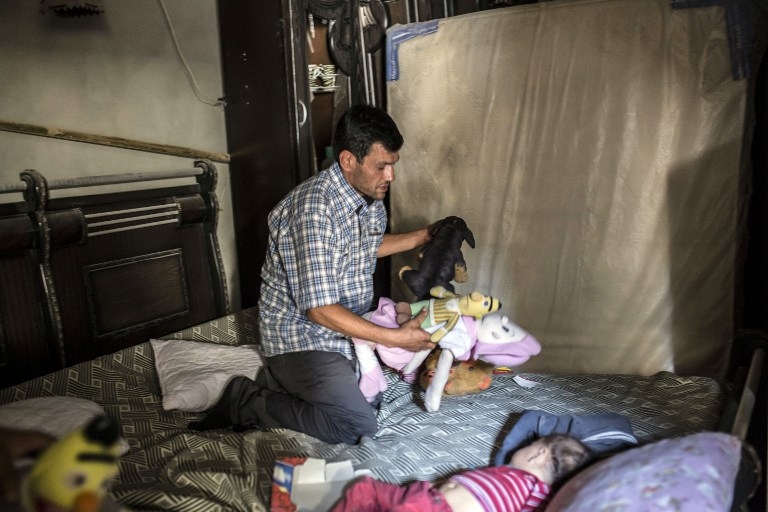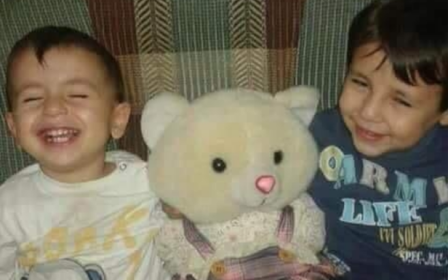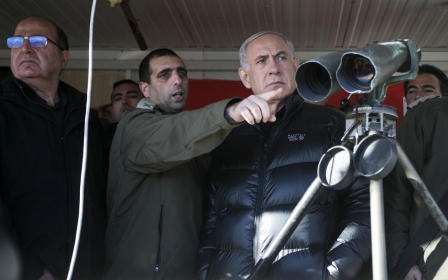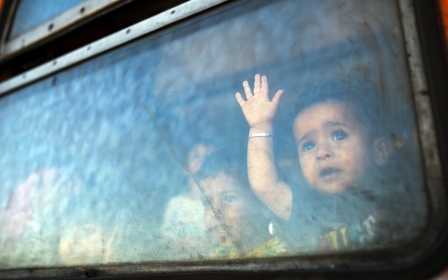Abdullah Kurdi: The long return to Kobane

SURUC, Turkey - Abdullah Kurdi’s sea journey was not meant to end in Kobane, the Syrian border town he had left several times over a decade in search of work and a stable life.
The 40-year-old surviving father of Aylan Kurdi, the Syrian toddler who drowned last week when his family tried to cross the Mediterranean to Europe and whose lifeless image on a beach has spurred a continent to debate its policies towards refugees, had been moving from place to place, trying to find security for his family away from the Syrian civil war for years.
“I decided to leave because I didn't want my children to go through what I went through,” Abdullah Kurdi told MEE of his treks.
Ahead of boarding a Greece-bound dinghy last week, he had hoped for a better life in Europe with his family, an end to a decade essentially at the whim of national and geopolitical events around him.
But he had not imagined the tragedy that awaited them in the choppy seas separating Greece from Turkey's shores and the funeral that would bring him back to his hometown, perhaps forever.
A Damascene hairdresser
Originally from Kobane, Kurdi said he moved to Damascus more than a decade ago. He settled in the predominately Kurdish neighbourhood of Reken al-Din, on the slopes of Damascus’ Jebel Kassioun, with his father and brother, where he worked as a hairdresser. By moving to Damascus from Kobane, he was one of thousands of Syrian Kurds who moved to more prosperous cities because employment opportunities lacked in the Kurdish areas of Syria.
However, when the Syrian civil war broke out, Kurdi's life in Damascus became increasingly precarious. Struggling to work amid the instability brought by the protests between the opposition and the Syrian government, he returned to Kobane.
In Kobane, Kurdi married his cousin, Rehan, and opened a barber shop. However, with a family to feed and rent to pay, Kurdi struggled to earn a stable income as Syria's war continued to have a drastic effect on the economy, Ferhad Abbas, a friend of Kurdi’s in Kobane, told MEE.
“Abdullah and Rehan were very poor here,” Kurdi's 83-year-old uncle, Khalid Sheno, said. “Abdullah opened a hairdresser shop here next to Rehan's father's store, but he couldn't pay the rent and keep his family afloat.”
Sheno said his nephew “was earning one-tenth of what he took as a hairdresser in Damascus”. The drop in income was difficult as Rehan had given birth to their first son, Galip and, after four months, Kurdi said he was forced to close the shop.
Cement maker in Tal Abyad
Struggling to make ends meet, Abdullah left his newborn son and moved to Tal Abyad, about 70km east of Kobane, alone at the end of 2011. Throughout 2012, Kurdi said he worked in a cement factory in the town, then in the control of the Assad government.
But when government forces retreated from Raqqa province at the end of 2012, the Islamist groups Ahrar al-Sham and al-Nusra Front took control of the strategic border town. Kurdi said many Kurds were forced to flee the city and surrounding villages as al-Nusra persecuted them.
“It became dangerous for Kurds,” he said. “So I quickly returned to Kobane.”
Determined to find work, Kurdi explained that he had no intention of staying in Kobane, which he said offered zero prospects of work. “I quickly resolved to go to Turkey,” he told MEE. After 10 days, he had moved to Istanbul.
Odd jobs in Istanbul
“In Istanbul, Abdullah worked in a factory in terrible conditions,” his uncle said. “The factory was 25km from his house, and he struggled to survive because of the high transport costs.”
For 18 months, Kurdi said he lived alone in Istanbul, sharing a house with other Syrian workers in the neighbourhood of Zeytinburnu. “Every few months, I'd return to Kobane to see my children and give money to my family,” he said.
But the situation in Kobane deteriorated quickly last September, when the Islamic State (IS) militant group launched a concerted offensive on the city. As much of Kobane was quickly overrun, Rehan and her two sons joined the hundreds of thousands of refugees who were forced to flee.
Unlike the majority of Kobane refugees who chose to stay in refugee camps in Suruc close to Kobane, the Kurdi family arrived in Istanbul to join Abdullah.
“We lived in the Eyup neighbourhood of Istanbul for one year,” Kurdi told MEE, “but my situation was very bad because I was a precarious worker doing odd jobs on building sites.”
In good months, he said he would earn 800 Turkish liras ($266) a month, but sometimes it would be much less. Struggling to survive, Kurdi said his sister Tima - who lives in Canada and also works as a hairdresser - paid 400 lira a month ($133) to pay for the rent.
Dreaming of Europe
With the dire situation in Istanbul and apparent encouragement from his sister, Kurdi made his first attempt to enter the EU eight months ago, at the start of 2015.
“The plan was to go to Europe alone with his brother, and to then sponsor Rehan and their children from there,” his uncle said. “Abdullah was never happy, he would never settle for what he had.”
Instead of attempting to cross the sea in south-west Turkey, which is too dangerous during the winter, he attempted to cross from Edirne, in northwest Turkey. However, the mission failed after Greek border guards caught them and handed them immediately to Turkey's border police.
After his brother, Muhammad, made a second, successful trip into the EU earlier this summer, a month ago Kurdi decided to try again and said he paid a smuggler $4,000, which his sister gave him, to take the whole family.
But soon after leaving the shore of Turkey, he said, the captain soon panicked as a result of high waves and jumped into the sea, leaving Abdullah in charge of the steering. Moments later, the dinghy capsized, and for the next three hours, Abdullah desperately tried to keep his wife and two sons alive.
Abdullah described lifting his children onto the side of the boat and begging them to cling onto the deflating dinghy. But slowly, they slipped from his grasp. Abdullah told MEE that the moment he realised his family had drowned he contemplated suicide there in the water. “I will now struggle with my conscience every day for the rest of my life,” he said.
At the funeral for Rehan, Galip and Aylan on Friday in Kobane, Kurdi said he would never leave the town again, according to his friend Ferhad Abbas.
“Why should I leave now that I have lost my family? I was going to Europe for my family, but now I am alone,” Kurdi said.
For Khalid Sheno, his nephew's story vindicates what he has always believed. “Europe will never help us. I'd rather live in Kobane and eat bread than to go to Europe,” he said. “Abdullah walked into the danger with his eyes closed. I told him to return to Kobane instead of going to Europe. But he dreamed of something else.”
New MEE newsletter: Jerusalem Dispatch
Sign up to get the latest insights and analysis on Israel-Palestine, alongside Turkey Unpacked and other MEE newsletters
Middle East Eye delivers independent and unrivalled coverage and analysis of the Middle East, North Africa and beyond. To learn more about republishing this content and the associated fees, please fill out this form. More about MEE can be found here.




